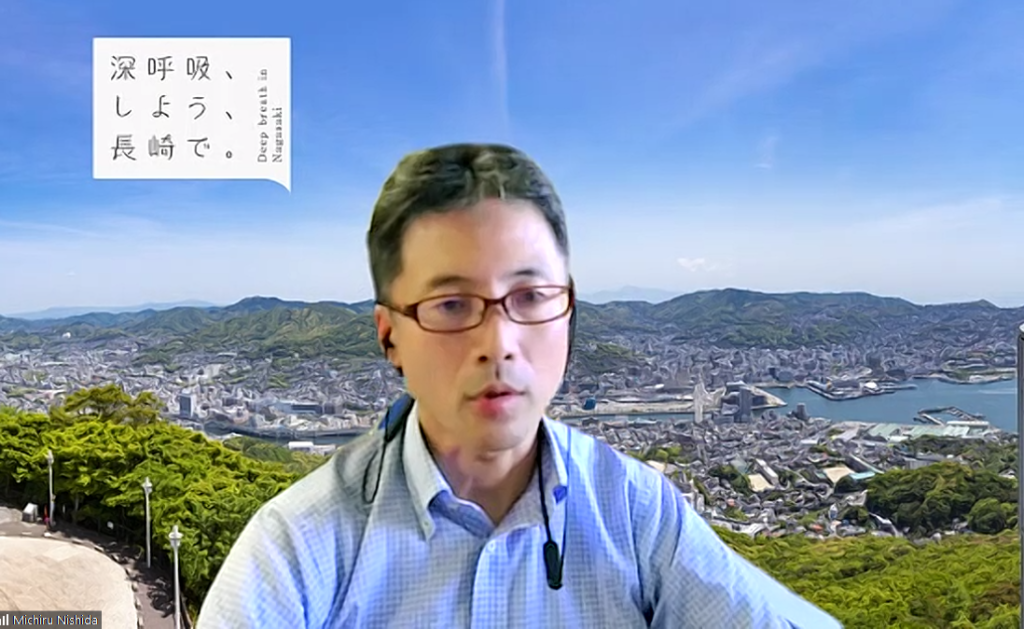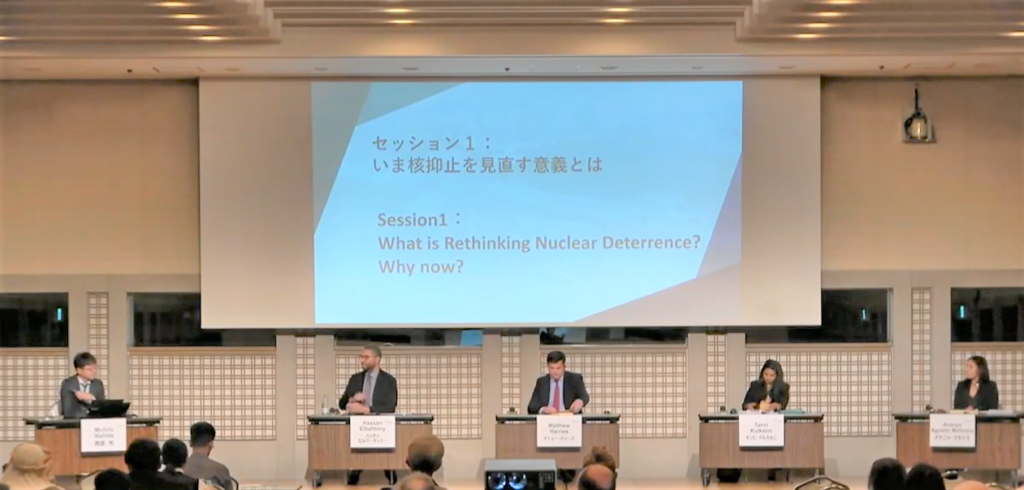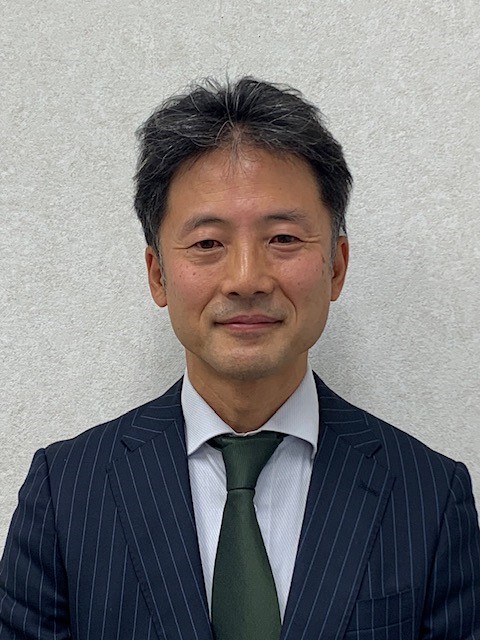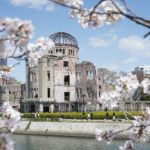Rethinking Nuclear Deterrence: Approaches for Moving Beyond the Current Limit
Interview with Prof. NISHIDA Michiru, Nagasaki University

In anticipation of the G7 Hiroshima Summit, a Summit-related public event “Rethinking Nuclear Deterrence: Approaches for Moving Beyond the Current Limit” was held in Hiroshima on April 28th, 2023. The event provided a variety of perspectives, including those from a working group led by Harvard University on this matter. Prof. Nishida Michiru of Nagasaki University’s School of Global Humanities and Social Sciences, who served as moderator of the event, explains what was discussed on the day.

Prof. Nishida Michiru (left-most) moderated the event held on April 28th at the International Conference Center Hiroshima.
The current situation on nuclear deterrence
The current situation is very different from that during the Cold War, when the concept of nuclear deterrence was born. During the Cold War, international politics was driven by a bipolar order involving the Eastern and the Western blocs led by the Soviet Union and the United States, respectively, and the main purpose of nuclear deterrence at the time was to prevent a full-scale nuclear war from breaking out between the United States and Soviet Union. However, Russia is currently in decline, with China emerging in its place. Attaining strategic stability among the three powers is extremely difficult. Furthermore, the more imminent risk today is the escalation of military conflicts and disputes in various regions, especially in Ukraine and North Korea, to the point of nuclear weapons being used. In this sense, the situation surrounding nuclear deterrence has become more complex than it was during the Cold War.
The need to rethink nuclear deterrence
In view of the situation described above, it is necessary to rethink nuclear deterrence in light of our current circumstances. Such a reconsideration may mean adapting nuclear deterrence to today’s state of affairs, but it may even entail questioning the premise of whether nuclear deterrence is necessary in the first place.
Furthermore, it may be necessary to go beyond traditional discussions on security and rethink nuclear deterrence from the perspectives of areas previously thought to be unrelated. A variety of perspectives were introduced during this session, including environmental perspectives that focus on climate change sparked by the use of nuclear weapons and global pollution resulting from radioactivity, as well as gender/feminist perspectives that regard nuclear power itself to be masculine in nature.
The difficulties in rethinking nuclear deterrence
Attempts to rethink nuclear deterrence need to acknowledge that it is generally extremely difficult for a country to choose to unilaterally give up its nuclear weapons while other countries that are considered to pose a threat to said country continue to possess nuclear weapons. One possible approach would be for both parties to gradually reduce and eventually give up on their nuclear arsenals simultaneously, but doing so would require maintaining a comparable balance of power between the two sides throughout the process. This is because nuclear weapons are perceived as a guarantee of one’s security, especially for the weaker nation. Even without raising the example of North Korea, there is little doubt that weaker countries believe that nuclear weapons can significantly correct the imbalance between them and stronger countries and thus allow them to maintain their own regime. Therefore, if an imbalance in power is the result of the proposal of having both parties give up their nuclear weapons simultaneously, it is highly unlikely that the weaker country will agree to do so given that nuclear weapons play the role of an equalizer and a game-changer in their eyes. In other words, rethinking nuclear deterrence from a security perspective will be fraught with difficulties regardless of the approach taken.
Approaching the issue from a historical precedent of going beyond nuclear deterrence
South Africa, which possessed nuclear weapons during the Cold War, abandoned all nuclear weapons around 1990. This was largely due to a considerable improvement in its immediate security environment, including the collapse of the Soviet Union. Another possible reason was that the administration led by white people did not want nuclear weapons to fall into the hands of the administration led by black people that was expected to emerge.
Examples such as South Africa have shown that nuclear weapons are considered necessary as long as there is a perceived threat in a country’s surroundings, as nuclear weapons are seen as a way to guarantee the country’s or its regime’s survival against that threat. Conversely, it is possible for a country to give up its nuclear weapons if such a threat does not exist. Of course, security is not the only factor that determines whether a country will hold on to its nuclear weapons or give them up, as there are other considerations related to domestic and international politics that come into play. However, at least from a security perspective, whether other countries can follow in the footsteps of South Africa would depend on the country’s security environment and threat perception.

Professor, School of Global Humanities and Social Sciences, Nagasaki University
NISHIDA Michiru
Prof. Nishida Michiru specializes in international security, arms control, disarmament, and non-proliferation. He was a long-time diplomat on nuclear-related issues as a Special Advisor on Arms Control, Disarmament and Non-Proliferation Issues at the Ministry of Foreign Affairs. He holds a Master’s degree (International Policy Studies & Non-proliferation) from the Middlebury Institute of International Studies at Monterey and a Ph.D. (Law) from Hitotsubashi University. He holds a concurrent appointment at the Research Center for Nuclear Weapons Abolition (RECNA), Nagasaki University.
Related article: Results of the G7 Hiroshima Summit-Related Public Event “Rethinking Nuclear Deterrence”
https://hiroshimaforpeace.com/en/g7-related-event0428-achieve/
Tags associated with this article




-150x150.jpg)


